"Life Goes on No Matter What"
As civilians and a maternity hospital in Ukraine are attacked, three Ukrainian women talk about giving birth during the war.
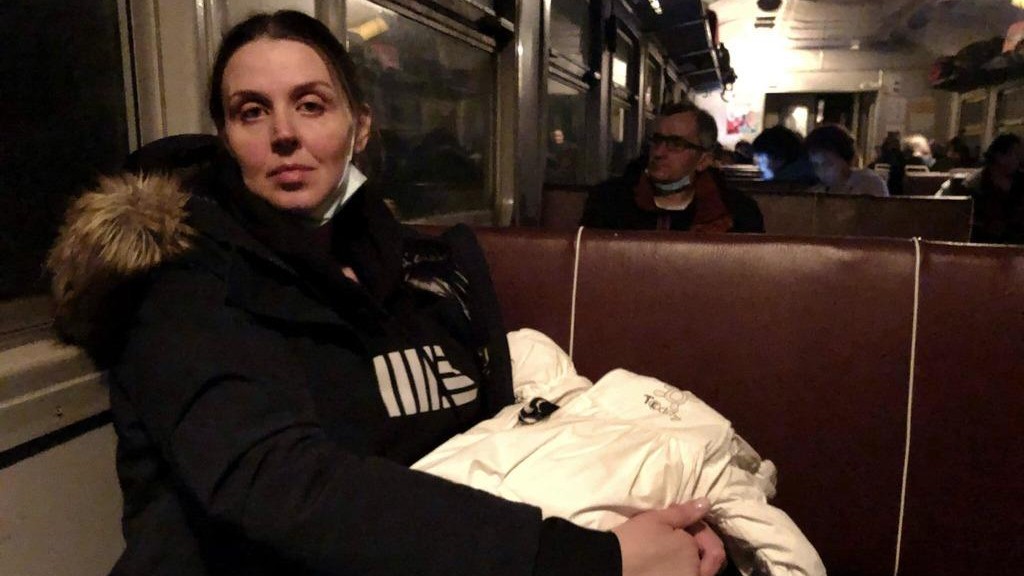

Air raid sirens wailed and artillery explosions blasted outside the hospital windows, but Anna and Kateryna tried to focus their attention elsewhere: on delivering healthy babies. Meanwhile, Vladislava left behind her husband to evacuate to a safer part of the country as she enters the third trimester of her pregnancy. All three women have had to navigate giving birth as their hometowns of Kyiv, Irpin, and Bucha, respectively, are invaded by Russian troops. All are withholding their last names to protect their privacy.
As the war drags on, places once considered safe for civilians are being attacked—just this week, a maternity hospital in Mariupol was hit by a Russian air strike, leaving 17 injured, according to Ukrainian officials.
We spoke to these three women about fear, survival, and bringing life into the world during such an uncertain and terrifying time.
Anna
My daughter was born in Kyiv on February 23 by cesarean section. The next day, on the morning of February 24, when I was feeding my daughter, I heard explosions, but I couldn't quite believe it. This is exactly what I had been afraid of—that war would break out in my hometown—but now that it was here as I laid in the hospital with my brand-new daughter, it barely seemed real.
That night, medical staff went room to room telling patients to pack the most necessary things in an emergency backpack and be ready to evacuate to the underground bomb shelter. They said they would tell us when it was time to go.
On the morning of the twenty-fifth, the first siren sounded, and we were promptly brought to the bomb shelter below ground. The shelter was filled with mothers and babies and doctors going from patient to patient to make sure we were all okay. Some doctors tended to the newborn babies, others gave the recovering mothers pain medication. The most impressive were the tiny premature babies, who were carried carefully with their life support systems by nurses.
Throughout the day, we shuffled back and forth from the hospital to the bomb shelter down below as sirens gave us warnings.
Get exclusive access to fashion and beauty trends, hot-off-the-press celebrity news, and more.
Finally, my 4-day-old daughter and I were discharged from the hospital during an evacuation between sirens. I took her home, staying in constant contact with my doctor.
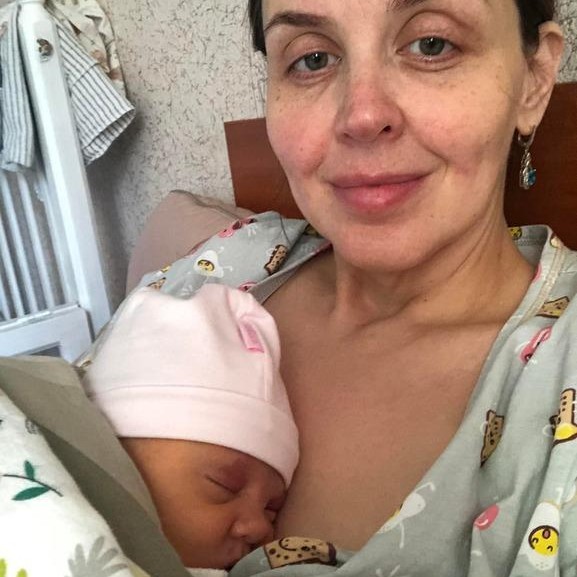
Anna with her daughter, who she delivered by cesarean section in Kyiv as the invasion began.
On the sixth day after the birth, my sister and I decided to leave Kyiv with my daughter. I was too overwhelmed to stay. We packed up our necessities which fit in two small backpacks and a suitcase. Of course, we wanted to bring more of our things, but we understood that it would make our movement much more difficult.
The trains leaving Kyiv were as full as possible, but we managed to get onto a train leaving for Lviv late that night. As soon as we got on the train, there was a loud explosion, and everyone in the train car dropped to the floor, unsure of what would happen next. I sat on the crowded train floor with my newborn daughter for a long time. I was afraid to get up.
Finally, the train pulled out of the station making the 12-hour trip to Lviv, 300 miles away. They were long and exhausting hours—the train had to stop often for traffic jams caused by other trains, some of which were knocked off the tracks or burned out. But still, we drove. As my daughter slept in my lap, I looked around at the other passengers, many of them were parents with their children and people with pets.
Currently, I am in Lviv region. When I arrived, I was given medical care—my stitches were removed and my daughter was examined. I needed a stroller, and the volunteers found two. The people I have met here are wonderful. It is unbelievable what people are willing to do to help strangers.
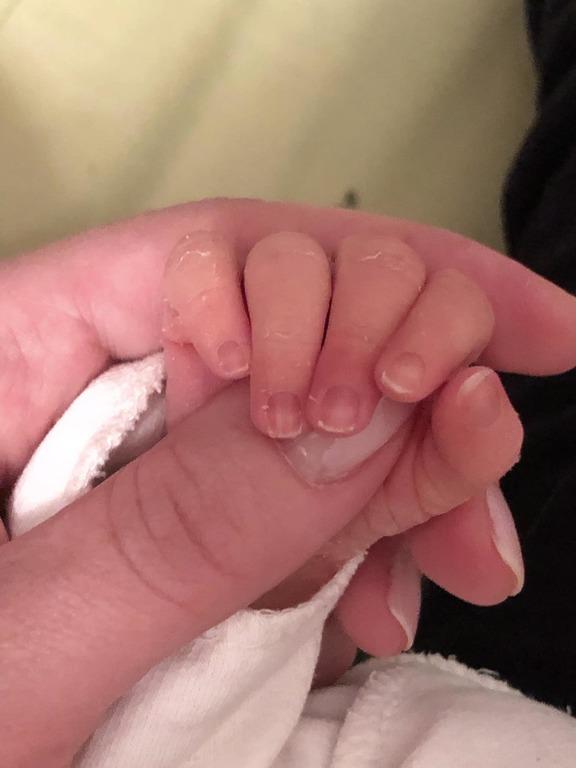
When Anna and her newborn arrived in Lviv, they were greeted by doctors and volunteers who provided her with a stroller.
The best news I’ve gotten since I arrived here was that I learned my 85-year-old father-in-law would be coming to stay with us. During the war, my country house was partially destroyed by a shell piece. My father-in-law was trapped there, without light or a way to communicate, surrounded by the Russian troops.
But this week, a man who was taking children out of a neighboring country cooperative through the fields had one extra seat in the car; he took my father-in-law. We were so relieved that he was safe and able to come be with us—and to meet his granddaughter.
Now, we are all together. And we are safe. But we don’t know what the future will bring. I try to read the news only twice a day, because I am worried that constant stress can affect my milk supply. I know that everything I do now affects the baby.
Vladislava
I had just begun the third trimester of my pregnancy when I got a call from a colleague: The war had begun. I asked my husband to begin packing up our home in Bucha, but I went to work. I work in the media as a video editor and I thought there would be some time before any fighting made its way to where we live in Bucha—I thought the clash would remain in Luhansk and Donetsk regions.
That first day, I thought to myself that we should have a full tank of fuel in the car, just in case. But I didn’t do that. And almost immediately, the constant pop, pop of shelling began raining down on my hometown, which is on the outskirts of Kyiv.
Still, we did not decide to leave the city immediately. We did not know where exactly the occupiers' equipment was, which roads were safe, and whether we’d be able to get enough gas to get us where we needed to go. And, mostly, we were afraid of being under the fire, which we constantly heard outside of our window. Eventually, we got used to sound of shootings and did not wake up if the shots outside our window were quiet.
During the day, we tried to distract ourselves inside with household chores—cleaning, playing board games, or cooking. When we finally went outside, we found that the stores had been ransacked by looters. So, we went home to eat our homemade bread—it turned out delicious.
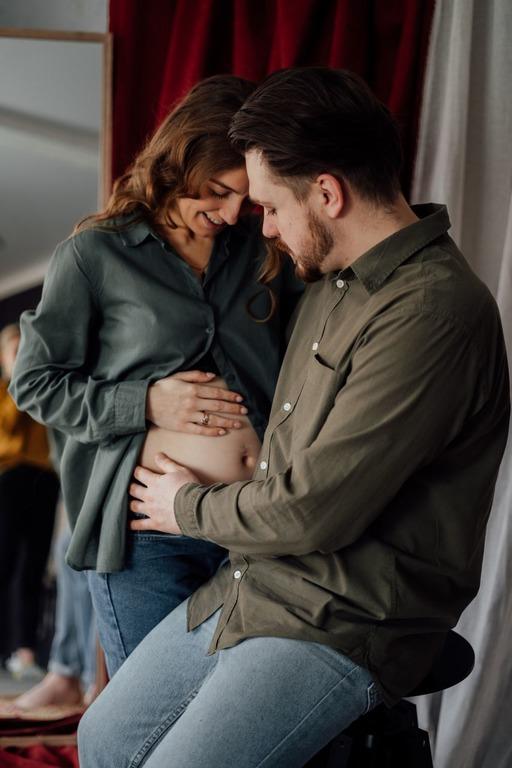
When Vladislava evacuated, her husband had to stay behind.
After nine days, I learned from an acquaintance about the evacuation train for women and children from the neighboring city of Irpin, and I decided to use it. The train did not take men, so I went with my mother and underage brother. My husband had to stay behind.
At the Irpin railway station, we almost came under fire, so we were evacuated in an alternative way—we had to cross the river on foot over the rickety, charred, bombed-out bridge.
That's how we got to the capital, where Ukrainian soldiers took us to the Kyiv train station. Due to the influx of people, we could not get on the first two trains heading to the Zakarpattia region in the West, so we decided to go in any western direction and accidentally got on the train to Lviv.
The situation at the Lviv train station was even worse. There were no tickets, and hundreds of people were waiting in line for boarding. But we had a plan B—my husband’s relatives were there, so we stayed with them for the night and continued our journey in the morning. We are now in a safe place near the western border. I don't know what comes next; maybe we will have to cross the border.
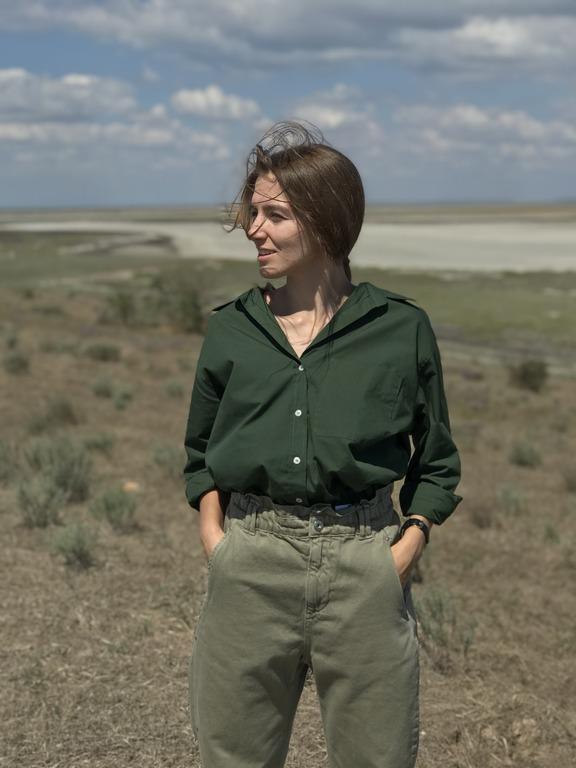
Vladislava walked over a bombed-out bridge to escape her hometown, which is being invaded by Russian troops.
Now, we watch the news all the time because we lost contact with many of our relatives, but we want to know what's going on. Accommodation was provided by friends of our friends and the Christian community. Some medical clinics have started volunteering and are conducting free examinations and ultrasounds for pregnant women, so we are taken care of—but it’s not the same going to the appointments without my husband.
Currently, my husband is at the epicenter of the fighting. In Bucha, there is no electricity, water, communications, or food to meet basic needs. The best part of my day is when I get the morning text from him. He tells me, “Everything is okay. The night was quiet.” I don't know how quiet it actually was—maybe he is trying to save my nerves and the baby I’m carrying. But he's alive and that's the only thing that matters. I don’t know when he’ll be able to leave to be with us. It worries me sick.
Kateryna
When everyone started talking about the war, I couldn’t believe it was really happening. I know that Russian military equipment was on Ukraine's borders and the probability of an invasion was very high, but it didn’t sink in until I got a call from my father. His voice was serious when he told me, “The war has begun.”
Everything inside me grew cold. I was pregnant and days away from my due date. I felt defenseless and helpless. As people in my town of Irpin began to evacuate, I knew I could barely even walk, let alone run. I was left with the feeling that there was nothing I could do about it. I even felt unable to take care of my 8-year-old daughter. The same thought ran through my mind over and over again: How will I survive in these conditions?
On the second or third day of fighting, I finally realized that this was a real war. I wondered how and where to give birth. The situation in Kyiv, about an hour away, was difficult. Hospitals received the wounded. Maternity hospitals on the outskirts of my city are not in good condition. I was even thinking about giving birth at home and looking for midwives who work online. But my doctor convinced me that was dangerous because of the possibility of bleeding. So, I decided to go to Kyiv.
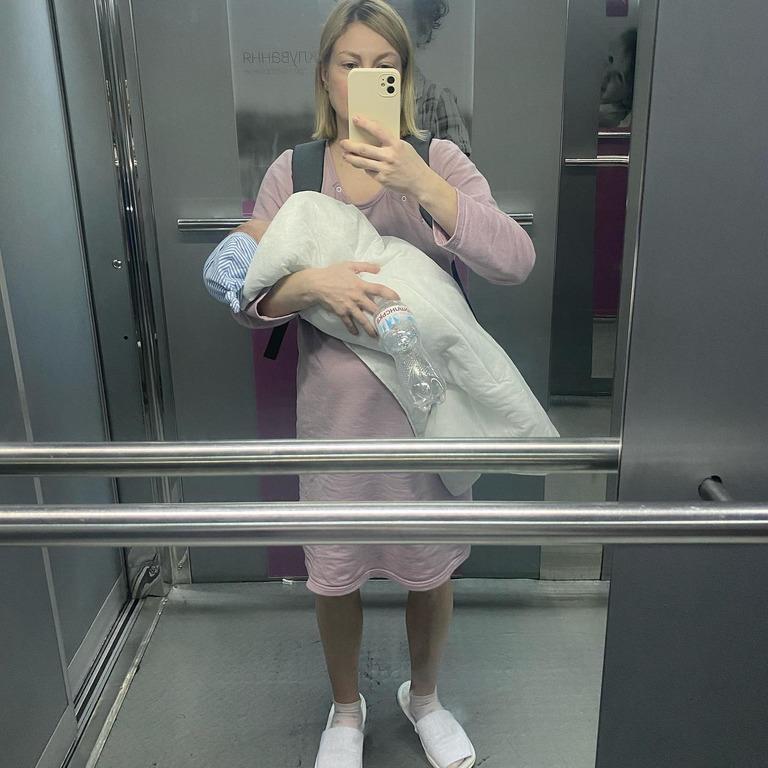
Kateryna left her hometown to give birth in Kyiv as the invasion began.
I didn’t wait for labor to start, because I worried about getting there in time; I knew shooting could happen at any moment. But on my way to the hospital, my contractions began—my son was on his way. Luckily, I made it to the hospital in time, and my little boy was born safely.
Normally, the drive from Irpin to Kyiv would be about an hour, but my family was in the car for eight hours—driving through gunfire and explosions—to come see me at the maternity ward. I was so worried waiting for them to arrive. I laid in my hospital bed scrolling through the endless feed of news updates hoping that my family—including my daughter—would get there safely.
My whole family was welcomed into the maternity hospital. My relatives were provided with a separate room where they could spend the night with their two big dogs and a cat. We knew that from here, they wouldn’t be able to return home, as the fighting was only getting worse.
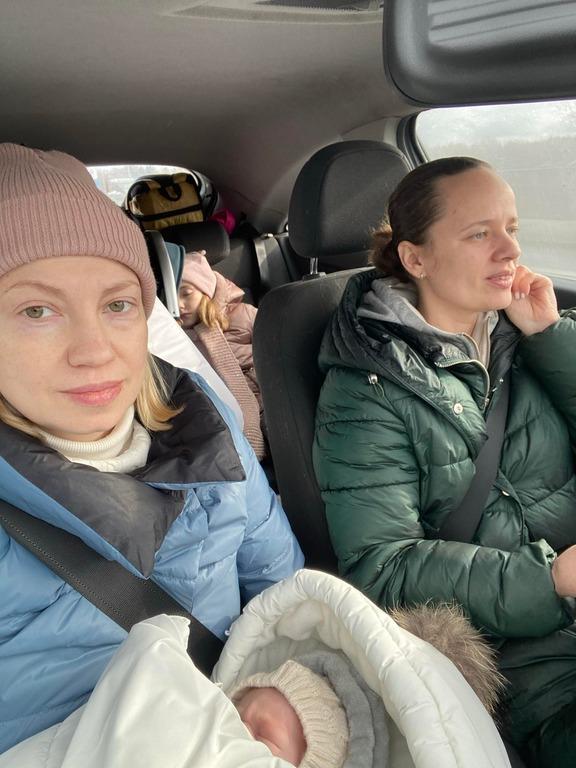
After giving birth, Kateryna evacuated with her sister, newborn son, and 8-year-old daughter.
Once I was discharged, we left the maternity hospital for Western Ukraine. I think it is quite safe here.
I am grateful my family and I are all together, but I am closely watching what is happening in Kyiv and Irpin, because my soul and heart have remained there. I even feel a little bit like a traitor that I'm safe here, but so many people aren’t. And I can't help them. I constantly hear the sound of the air-raid sirens, even when there are none. When a door slams, I hear an explosion. War makes us all defenseless and exposes our humanity.
My consolation is the birth of a son. It is a confirmation that life goes on no matter what. The baby needs a lot of attention—and he needs me to be healthy. I look at him, and it gives me faith that everything will be fine, that one day it will all end and we will be able to return home.
Translation by Lina Pilipchuk
Journalists at Marie Claire Ukraine contributed reporting to this story. If you'd like to support their efforts, a GoFundMe has been established for their publisher, Burda Media.
